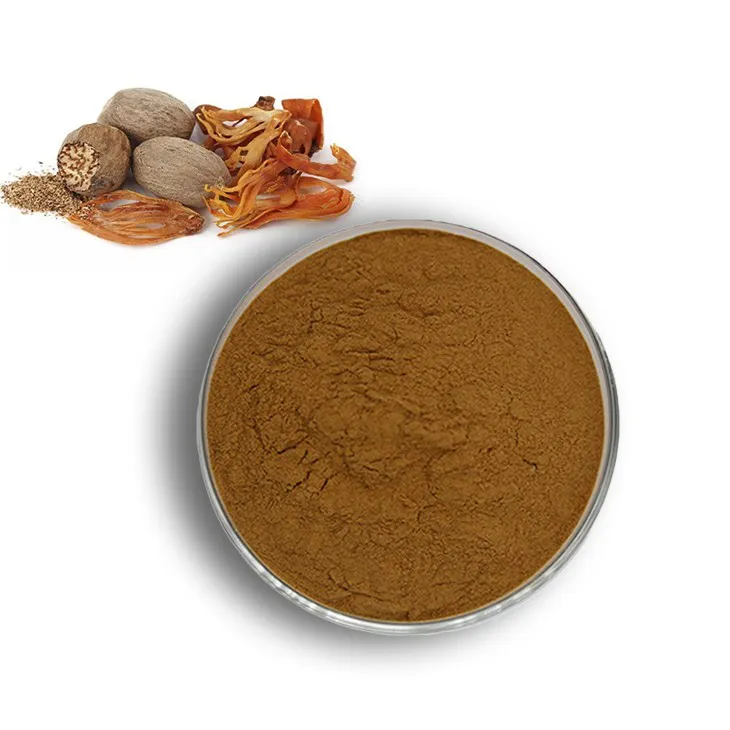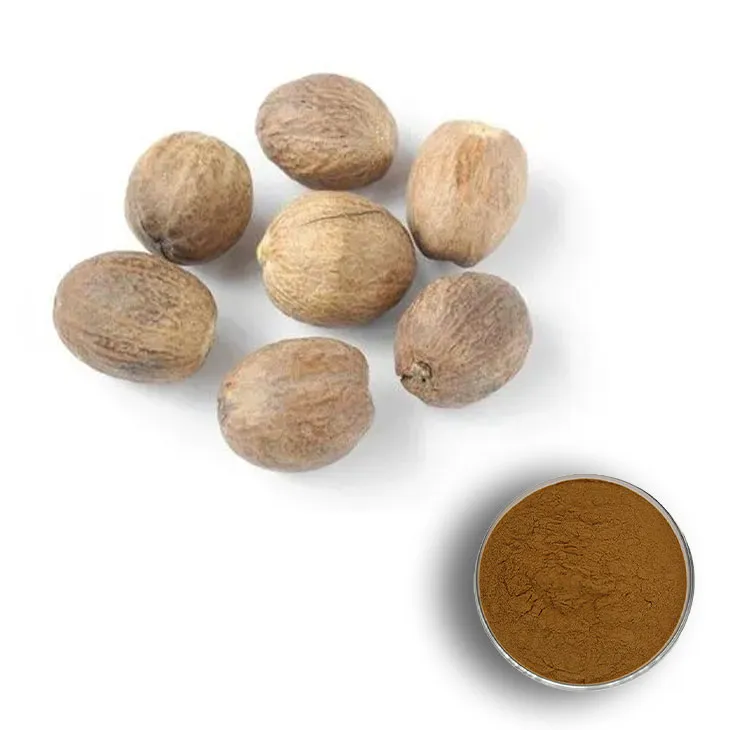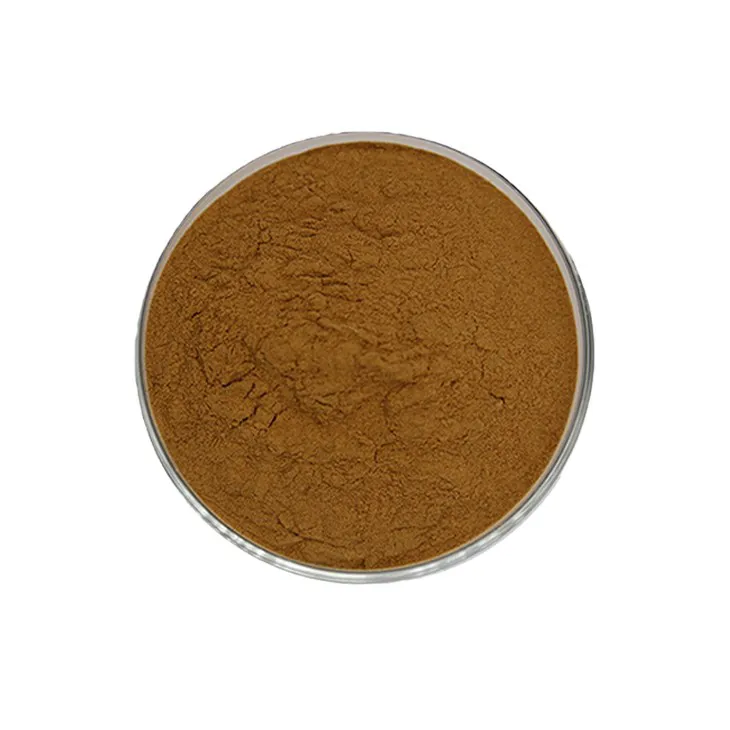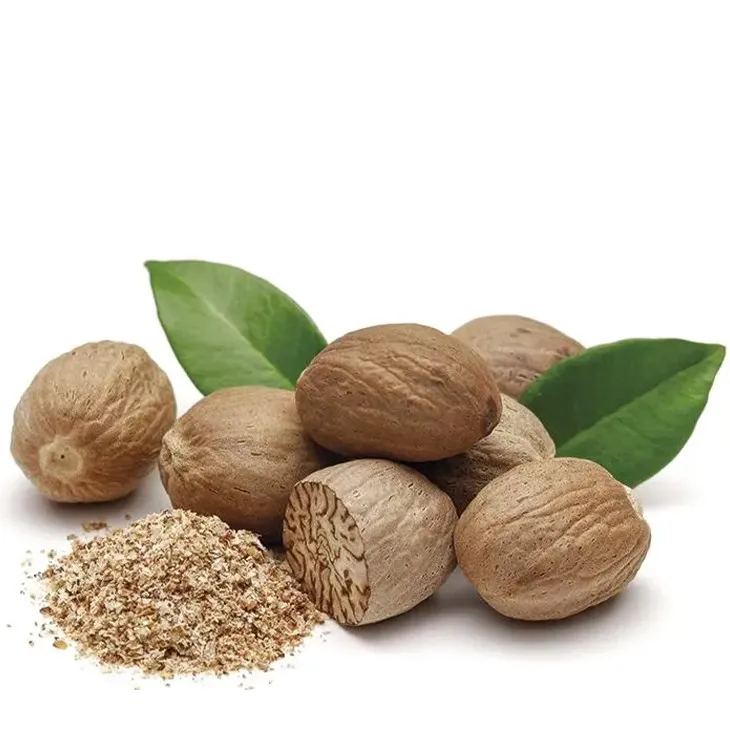- 0086-571-85302990
- sales@greenskybio.com
Nutmeg extract: Benefits and consumption guidelines.
2024-11-12

1. Introduction
Nutmeg, a spice derived from the seed of the Myristica fragrans tree, has been used for centuries in cooking and traditional medicine. Nutmeg Extract, which contains concentrated forms of the active compounds in nutmeg, has recently been gaining popularity due to its potential health benefits. This article will explore the various benefits of Nutmeg Extract and provide comprehensive consumption guidelines to help readers make informed decisions about using this natural product.

2. Nutritional Composition of Nutmeg Extract
Nutmeg extract is rich in a variety of nutrients and bioactive compounds. Some of the key components include:
- Myristicin: This compound is one of the main active ingredients in nutmeg. It has been studied for its potential antioxidant and anti - inflammatory properties.
- Eugenol: Eugenol is known for its antibacterial and antifungal effects. It may also contribute to the overall health - promoting properties of nutmeg extract.
- Fixed oils: Nutmeg contains a significant amount of fixed oils, which can provide energy and may have other beneficial effects on the body.
- Proteins and amino acids: Although present in smaller amounts, these are essential for various physiological functions in the body.

3. Health Benefits of Nutmeg Extract
3.1 Antioxidant Properties
Antioxidants play a crucial role in protecting the body from oxidative stress. Myristicin and other compounds in nutmeg extract have been shown to possess antioxidant properties. Oxidative stress is associated with a variety of health problems, including heart disease, cancer, and neurodegenerative disorders. By neutralizing free radicals, nutmeg extract may help reduce the risk of these diseases.
3.2 Anti - Inflammatory Effects
Chronic inflammation is a key factor in many diseases. Nutmeg extract has demonstrated anti - inflammatory properties in several studies. The anti - inflammatory action may be due to the presence of compounds like myristicin and eugenol. This makes it potentially useful in managing conditions such as arthritis, where inflammation is a major symptom.
3.3 Digestive Health
Nutmeg extract may have a positive impact on digestion. It has been traditionally used to relieve digestive problems such as indigestion, bloating, and constipation. Some of the ways it may improve digestion include:
- Stimulating the production of digestive enzymes, which helps break down food more efficiently.
- Relaxing the smooth muscles in the digestive tract, which can ease the movement of food through the intestines.
3.4 Other Potential Benefits
There are also some other potential benefits associated with nutmeg extract:
- It may have a positive effect on the nervous system. Some traditional uses suggest that it can help relieve stress and anxiety, although more research is needed in this area.
- There is some evidence to suggest that it may have a role in improving blood circulation, which could be beneficial for overall cardiovascular health.

4. Consumption Guidelines for Nutmeg Extract
4.1 Proper Dosage
The appropriate dosage of nutmeg extract can vary depending on several factors, including the form of the extract (e.g., liquid, capsule), the individual's age, health status, and the intended use. As a general guideline, for adults, a typical dose may range from 500 - 1000 mg per day. However, it is always best to consult a healthcare professional before starting any new supplement regimen.
4.2 How to Consume
Nutmeg extract can be consumed in several ways:
- Capsules: This is a convenient form for those who prefer a pre - measured dose. Capsules are available in various strengths and can be easily incorporated into a daily supplement routine.
- Liquid Extract: Liquid nutmeg extract can be added to water, juice, or other beverages. It is important to follow the recommended dosage instructions carefully when using liquid extracts, as they can be more concentrated.
- Food Incorporation: A small amount of nutmeg extract can also be added to foods such as smoothies, yogurts, or baked goods. This is a great way to enjoy the benefits of nutmeg extract while also adding flavor to your food.
4.3 Potential Side Effects
While nutmeg extract has many potential health benefits, it can also have some side effects if consumed in excessive amounts. Some of the possible side effects include:
- Nausea and vomiting: Consuming too much nutmeg extract can irritate the stomach and lead to feelings of nausea and vomiting.
- Dizziness and confusion: High doses may affect the central nervous system, causing dizziness and confusion.
- Allergic reactions: In some rare cases, individuals may be allergic to nutmeg or its components, resulting in allergic reactions such as skin rashes or difficulty breathing.
4.4 Who Should Avoid Nutmeg Extract
There are certain groups of people who should avoid using nutmeg extract:
- Pregnant Women: Nutmeg extract may have uterine - stimulating effects, which could be harmful during pregnancy. It is best for pregnant women to avoid it to prevent any potential risks to the fetus.
- People with Liver or Kidney Problems: Since the liver and kidneys are involved in metabolizing and excreting substances from the body, individuals with liver or kidney problems may have difficulty processing nutmeg extract. It is advisable for them to consult their healthcare provider before using it.
- Those with a History of Allergic Reactions to Nutmeg: As mentioned earlier, people who have had allergic reactions to nutmeg in the past should avoid using nutmeg extract to prevent recurrence of allergic symptoms.

5. Conclusion
Nutmeg extract offers a range of potential health benefits, from antioxidant and anti - inflammatory properties to possible positive effects on digestion and other aspects of health. However, it is important to consume it in moderation and be aware of the potential side effects and contraindications. By following the consumption guidelines provided in this article and consulting a healthcare professional when necessary, individuals can make informed decisions about whether nutmeg extract is a suitable addition to their health regimen.
FAQ:
What are the main benefits of nutmeg extract?
Nutmeg extract is rich in nutrients and bioactive compounds. It has antioxidant properties, which can help combat free radicals in the body. Its anti - inflammatory properties may reduce inflammation. It also has a possible positive impact on digestion, potentially aiding in the proper functioning of the digestive system.
What is the proper dosage of nutmeg extract?
The proper dosage of nutmeg extract can vary depending on various factors such as age, health condition, and the purpose of use. Generally, it is recommended to follow the instructions on the product label. However, in most cases, a small amount is sufficient. For example, a few drops or a small sprinkle of the extract may be enough in cooking or for mild health benefits. But it is always best to consult a healthcare provider for personalized dosage advice.
Are there any potential side effects of nutmeg extract?
Yes, there can be potential side effects. Consuming large amounts of nutmeg extract can lead to symptoms such as nausea, dizziness, and in severe cases, it may even cause hallucinations. Additionally, it may interact with certain medications. People with pre - existing medical conditions, especially those related to the nervous system or liver, should be particularly cautious.
Who should avoid using nutmeg extract?
Those with a history of allergic reactions to nutmeg should avoid it. Pregnant women are also advised to avoid nutmeg extract as it may have potential effects on the fetus. People with certain medical conditions such as liver problems, epilepsy, or those taking medications that may interact with nutmeg should also refrain from using it without consulting a healthcare professional.
How can nutmeg extract be incorporated into daily life?
Nutmeg extract can be added to various foods and beverages. It can be used in cooking, for example, added to baked goods like cakes and cookies, or in warm beverages such as milk or tea. However, when adding it to food or drinks, it is important to be mindful of the dosage to avoid overconsumption.
Related literature
- The Health Benefits of Nutmeg and Its Compounds"
- "Nutmeg Extract: A Comprehensive Review of Its Properties and Applications"
- "Safe Consumption of Nutmeg - Derived Products: A Scientific Perspective"
- ▶ Hesperidin
- ▶ Citrus Bioflavonoids
- ▶ Plant Extract
- ▶ lycopene
- ▶ Diosmin
- ▶ Grape seed extract
- ▶ Sea buckthorn Juice Powder
- ▶ Fruit Juice Powder
- ▶ Hops Extract
- ▶ Artichoke Extract
- ▶ Mushroom extract
- ▶ Astaxanthin
- ▶ Green Tea Extract
- ▶ Curcumin
- ▶ Horse Chestnut Extract
- ▶ Other Product
- ▶ Boswellia Serrata Extract
- ▶ Resveratrol
- ▶ Marigold Extract
- ▶ Grape Leaf Extract
- ▶ New Product
- ▶ Aminolevulinic acid
- ▶ Cranberry Extract
- ▶ Red Yeast Rice
- ▶ Red Wine Extract
-
Echinacea Extract
2024-11-12
-
Saw Palmetto Extract
2024-11-12
-
Beetroot juice Powder
2024-11-12
-
Centella Asiatica Extract
2024-11-12
-
Black Pepper Extract
2024-11-12
-
Bamboo Leaf extract
2024-11-12
-
Phellodendron Extract
2024-11-12
-
Grapefruit Seed Extract Powder
2024-11-12
-
Dandelion Root Extract
2024-11-12
-
Jujube Extract
2024-11-12





















